HealthManagement, Volume 24 - Issue 2, 2024
In the Apulia Region, healthcare innovation in telemedicine began many years ago through various projects. The National Recovery and Resilience Plan (NRRP) provides for interventions to strengthen and innovate the technological and digital structure of the Italian NHS. Therefore, in continuity, Apulia has started the design and implementation of the platform for the management of transitional assistance by the Territorial Operational Centers (TOC) of the health authorities of the Apulia Region. The Apulia Region and AReSS have also approved a series of acts aimed at regulating the establishment of the Apulian TOC and the interconnection with regional and national information systems.
Key Points
- Interoperability with digital health regional and national systems.
- Empowerment, change management, training and digital literacy of all stakeholders of the health system.
- e-Health ecosystem and interconnection.
- Systematic approach in Continuing Training and Digital Competence Consolidation.
Introduction
The Apulia Region is a precursor in terms of innovation in digital healthcare and telemedicine; in fact, the design of the new Apulian e-Health ecosystem model began as early as the 2000s. The COVID-19 pandemic has evidently accelerated the need to update, strengthen, and develop digital systems in healthcare.
In recent years, the Apulia region has committed itself to responding to the new and ever-increasing health needs of Apulian citizens and to adapting local health services in compliance with the legal framework, quality, and sustainability criteria.
The Apulia Region’s experience in telemedicine culminates in the Regional Operating Center of Telemedicine for Chronic Diseases and Clinical Networks (CORēHealth).
Furthermore, Apulia, exploiting the resources of the NRRP - C2 M6, has started activities of designing and implementing the platform for the management of transitional care by the Territorial Operations Centers of the Health Authorities of the Region: TOC interconnection.
CORēHealth
CORēHealth is Apulia’s telemedicine operating centre (Gorgoni et al. 2022a), winner of numerous national and European awards (Gorgoni et al. 2022b; Gorgoni et al. 2022c; Regions4PerMed Best Practices Award; DT4REGIONS Award; Digital Agenda 2022 Award). In 2020, the Apulia Region, by act of the Regional Government n.1088, established CORēHealth within AReSS, providing operational guidelines for the promotion and dissemination of telemedicine in the health service.
The Agency followed up on the mandate conferred by the region and began to develop the infrastructure, the platform and the mobile app of the operating centre.
CORēHealth is part of the Regional Health Services Network via dialoguing and cooperating with the various institutional and operational stakeholders of the area. It is the institutional and operational reference for all e-Health initiatives implemented by Apulia. CORēHealth, in its full operational mode, provides for central coordination of the various e-health solutions implemented at the regional level, guaranteeing technological interoperability and a vast range of services, working as a service provider for regional e-health services. The involvement is extended to almost all subjects belonging to the regional social-health sector.
Another key element is the systematic approach in Continuing Training, Digital Competence Consolidation and digital skills built to enable informed access of all the actors involved to the new digital technologies: among the enabling factors of digital health, the digital skills spread to all professionals are undoubtedly an essential strategic element. For this reason, AReSS has designed a path of change management, training and digital literacy of all users of the system (both medical and administrative teams) and patients so that CORēHealth does not remain a mere tool, albeit technologically advanced, but represents a real organisational shift toward a new and innovative way of caring for chronic patients with benefits for both patients and caregivers.
The platform will enable each supply centre to manage its clients according to defined and suitably modelled processes.
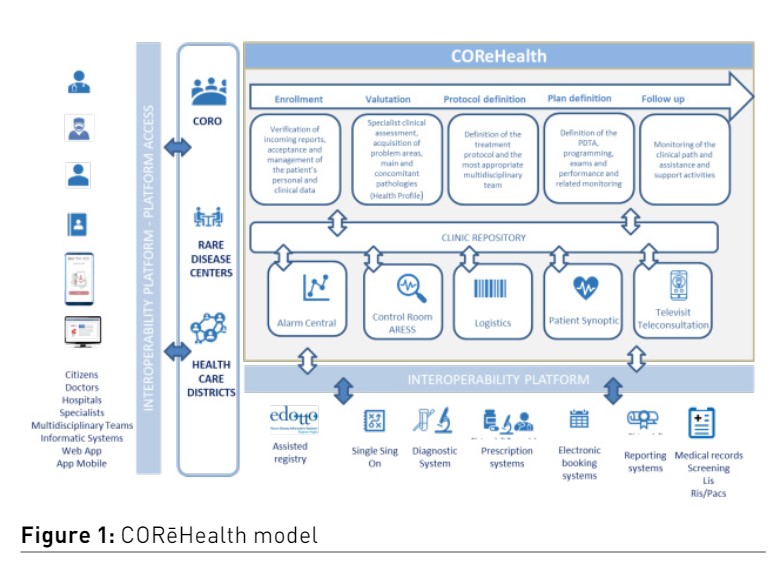
From a more strictly technical point of view, the platform implements an application solution that enables the model at a regional level, implementing the technological transformation towards a cloud environment, as well as the re-engineering and migration of its application systems on the cloud infrastructure of the service centre of Innovapuglia (in-house IT provider of the region). Furthermore, this software module is certified as a medical device.
The project includes, among other technological components, the following (Figure 2):
- platform for the management of chronicity and clinical networks;
- Televisit, teleconsultation, telemonitoring, telecooperation and teleconference platform;
- Televisit and teleconsultation system;
- Device traceability system;
- Clinical repository;
- Mobile app for citizens (available on the Android and iOS stores), with guaranteed access via SPiD/eIDAS, which facilitates their involvement in the care process: keeping in touch with their specialist doctor and caregiver (video calls and chat); consult the agenda of scheduled televisits with patient’s care team; view the treatment plan; enter the vital parameters that are communicated to the doctor in real-time; promote the measurement of adherence to the treatment pathway (drug intake, lifestyle), etc. (Figure 3);
- Patient synoptic: certified medical device for the collection and visualisation of parameters and clinical data (Figure 4);
- AReSS alarm centre for centralised monitoring by the agency, which is proposed in the form of a real-time dashboard;
- HL7 FHIR Interoperability Platform for integration management;
- Integration with the Regional Health Information System “Edotto”, EHR (Electronic Health Record), clinical files and with the LIS, oncological screening, RIS/PACS systems (in the planning phase).
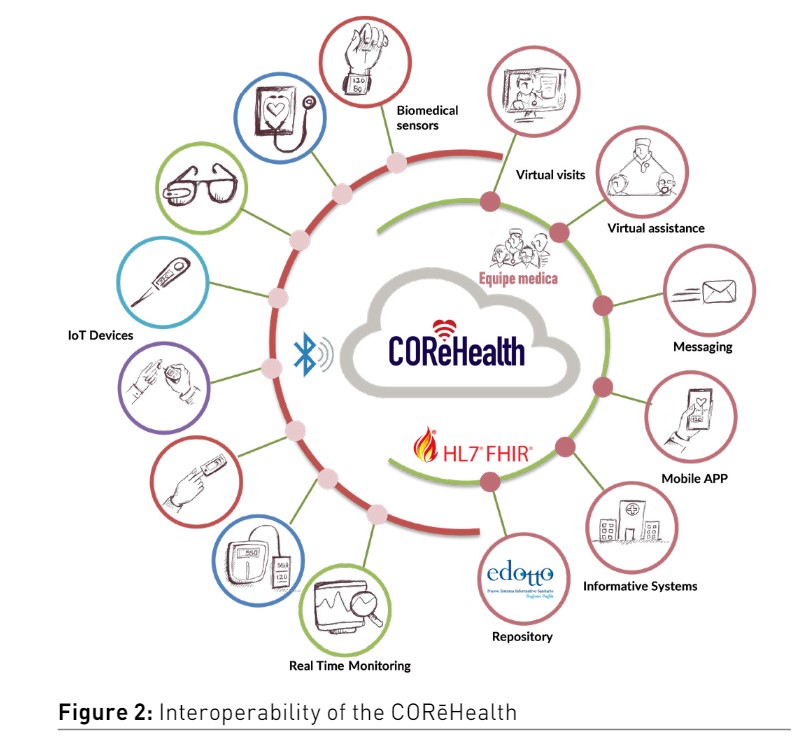
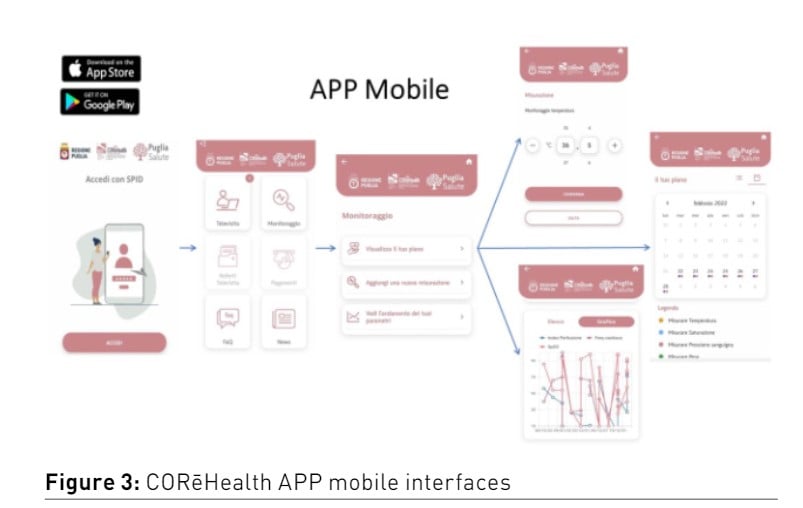
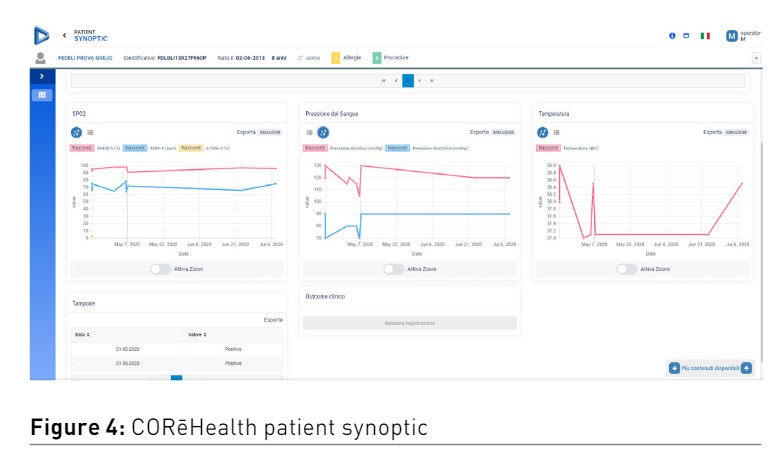
Each patient is assigned an Integrated Care Pathway (“PAI”) based on the specific treatment plans of their pathologies (Diagnostic Therapeutic Care Plan) and, if necessary, a medical device kit, interoperable with the unit, for the detection and monitoring of key vital parameters.
The medical team, based on specific needs, can provide patients with a medical device kit (tablet, pulse oximeter, multi-parameter, scale, etc.), interoperable with the unit, suitable for real-time detection and monitoring of vital parameters, salient features that enable constant detection and monitoring, allowing possible intervention by virtue of the automatic alarm system with which the control unit is equipped (Figure 5).
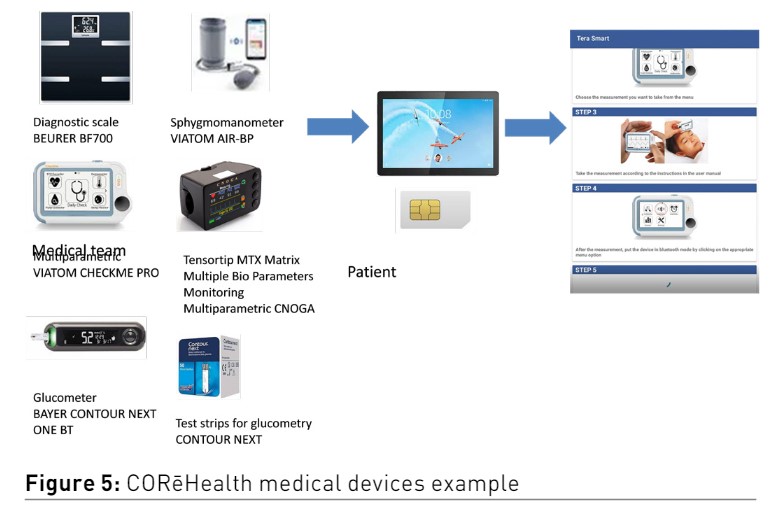
CORēHealth thus provides the care team with a web-cloud (back office) platform available for the remote digital management of their patients by offering, among the main services: personalised patient monitoring paths (telemonitoring), teleassistance, televisit, teleconsultation and remote health collaboration, digitised services for taking charge of patients, personalisation and management of patient care plans, logistics/warehouse management of medical device kits (Figure 6).
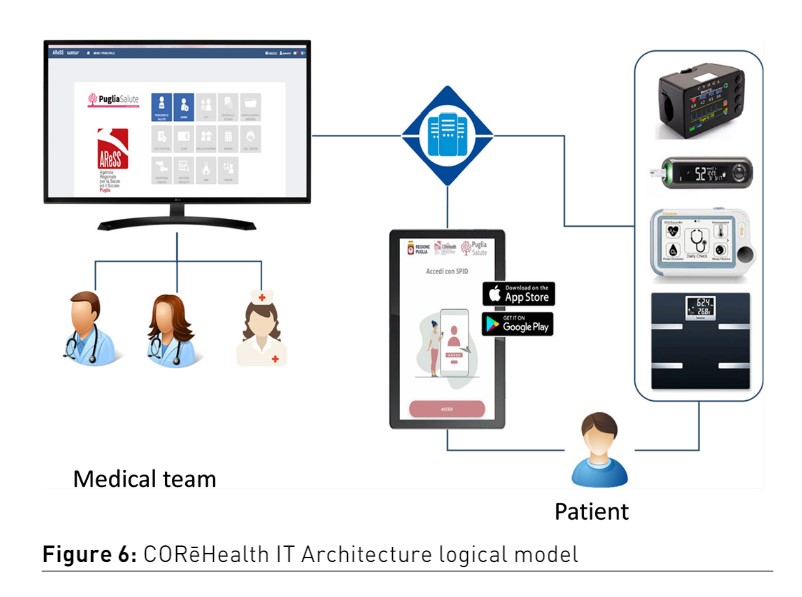
The trial phase of CORēHealth, which ended in December 2021, focused on four regional pilot projects: the Oncology Department of the San Paolo Hospital in Bari (for breast cancer), the Thalassemia Center in Brindisi (for thalassemia), the Putignano District (for diabetes and hypertension), and the Local Health Authority of Taranto (for rural medicine).
As of January 2022, training of Regional Oncological Guidance Centers and Breast Unit providers and the enrolment of approximately 23,000 cancer patients (breast).
Territorial Operations Center
The National Recovery and Resilience Plan (NRRP) allocated approximately €9 billion for interventions in Italy aimed at strengthening the services provided in the area thanks to the strengthening and creation of local structures and facilities, the strengthening of home care, the development of telemedicine and more effective integration with all social and health care services. This initiative arises in the context of NRRP component 2 of mission 6, which embraces interventions aimed at strengthening and innovating the technological and digital structure of the Italian NHS to guarantee a significant evolution of healthcare methods. In this context, Apulia has started activities aimed at designing and implementing the platform for the management of transitional care by the Territorial Operations Centers of the Health Authorities of the Apulia Region: TOC interconnection.
The Territorial Operations Center (TOC) is a back office organisational model that carries out the function of coordinating the taking charge of the person and relationships between services and professionals involved in the different care settings through the connection of the nodes of the intermediate care network enabling and facilitating connections between professionals and the patient journey between different healthcare locations and providers.
The Apulia Region and AReSS Puglia have approved a series of acts regulating the establishment of the Apulian TOC and its interconnection with regional and national information systems.
By the act of the Regional Government n.625/2023, AReSS has been committed by the Apulia Region to start the competitive relaunch within the framework of the Consip Framework Agreement, called AQ Digital Health 2, with a starting bid amount equal to Euros €2,292,555.25. The act also established that CORēHealth plays the role of a technological platform for the management of transitional care, which allows the TOC to play the role of integrator and facilitator between the hospital and the territory (Figure 7).
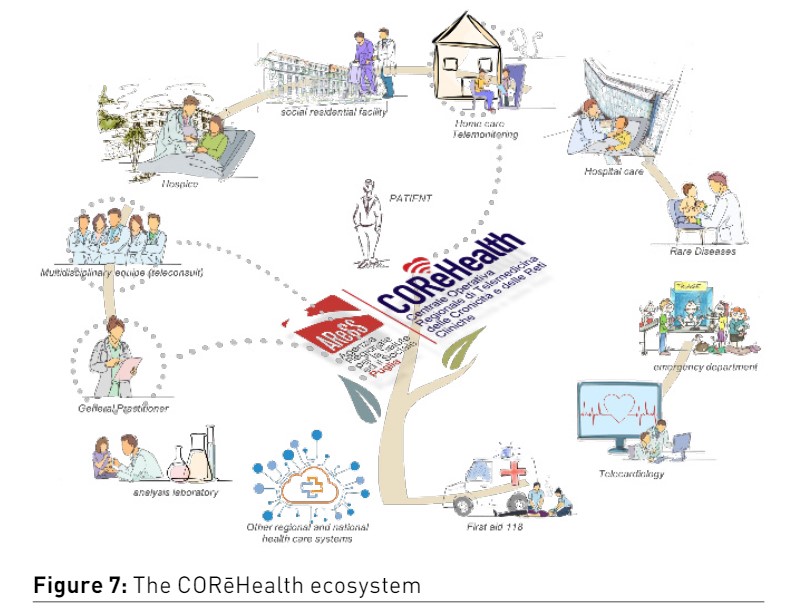
The TOC interconnection platform must interface to ensure interoperability with:
- Computer telephony integration;
- Regional registry of recipients, national registry of recipients and company contacts through the master patient index system and related caregiver contacts;
- Acceptance systems, waiting list management, etc;
- Emergency room systems;
- Single booking centre, e-prescription system and e-payment system;
- Company’s diagnostic therapeutic assistance management system;
- Hospital systems and local healthcare settings;
- Electronic Medical Record;
- Regional screening modules;
- Third-party systems and any other clinical system necessary to provide data and information for patient care (both regional and national);
- National Telemedicine Platform and the related services;
Interoperability will be guaranteed by referring to technological standards, with particular regard to formats in the healthcare sector, as well as in compliance with current regulations.
The TOC interconnection interventions must inevitably consider the ecosystem of the Health Information Systems of the Apulia Region and its local health authorities, including GDPR compliance, which is assured by continuous assessment of the related legal aspects.
Conclusion
The road ahead is still long and challenging but certainly less tortuous than when this journey was undertaken. Our next goal is to follow and monitor chronic/ill patients in every stage of his/her illness thanks to CORēHealth, the COT module and the interoperability with other medical systems.
The technologies are now mature, as are the processes and actors. Now more than ever, they are fully aware of the benefits (in economic, time, and efficiency terms) that can be drawn from the use of digital technology in healthcare.
The greatest benefit, however, is for the patients, who are truly the protagonists of the innovation.
Digital literacy processes are fundamental, aimed at increasingly reducing the gap between technology and users, who are often elderly.
The autonomy and independence in the management of medical devices by the patient who can be monitored in real-time from the comfort of home as well as follow a personalised treatment plan are increasingly important within the legal framework established at the national and regional levels.
The Apulia region, therefore, continues to invest in the topic with a series of objectives that can also be achieved in the medium term, such as:
- Implementation of CORēHealth at the Lecce Penitentiary Institute;
- Launch of further digitalised care lines at the local health authorities of BAT (Barletta-Andria-Trani) and Taranto;
- Extension of the telemedicine service to all chronic diseases in the Apulia Region, including rare diseases.
Conflict of Interest
None.
References:
DT4REGIONS Award Solutions for Public Administration based on AI and Big Data. Public’s favourite selected and awarded by users of the DT4REGIONS Platform, 2023.
Digital Agenda Observatory, Digital Agenda 2022 Awards, Regional Digital Agendas.
Gorgoni G, Maglio G, Notarangelo P, Petrarolo V (2022a) Agenda Digitale.eu. CORēHealth: how the Apulian telemedicine centre looks like. Available at https://www.agendadigitale.eu/sanita/corehealth-come-fatta-la-centrale-di-telemedicina-pugliese/
Gorgoni G, Notarangelo P, Petrarolo V (2022b) Forum PA Sanità. COReHealth - The Regional Telemedicine Operations Centre of the Apulia Region. Award.
Gorgoni G, Notarangelo P, Petrarolo V (2022c) Innovation in Digital Health, Building Biotech Bridge. CORēHealth. Award.
Interregional coordination for a fast and deep uptake of personalised health. Regions4PerMed Best Practices Award. Key thematic area 4 “Innovation Flow in the Healthcare”. 22 March 2023





